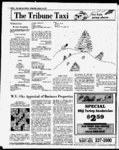| Show 4SV Thc’foli Lake Tribune Wednesday January 13 1888 Former Welfare Recipient Thanks Taxpayers I am feeling wonderfully well now Ann Landers' column appears daily in the Salt Lake Tribune's Lifestyle section Dear Ann Landers: I hope you will print this letter My message is important and I would like as many people to see it as possible Dear American Taxpayer I want to say thank you for the food shelter dentures hospitalization and the training as a computer operator that you have given me off and on since 1969 during those terrible times when I suffered from depression and mental illness and am able to take care of myself This would not have been possible had I not received government assistance Our American system really does work and I want to say God bless all of you who made it possible — A Grateful Recipient in Michigan Dear Recipient: Thank you for a gracious letter It's one that I hope will be seen by all those folks who resent people on welfare Your mention of the training you received gives me an opportunity to say that the way to get off the dole is to learn a useful skill How true is old Chinese proverb “Give a man a fish and you feed him for a day Teach a man to fish and you feed him for a lifetime” Dear Ann Landers: You are my last resort outside of professional counseling Please don’t fail me My husband and I have been married a few months short of a year and we get along very well together The only serious arguments we’ve had are about his mother The woman has a tendency to look for fights and her letters are full of insults When we talk on the phone I am a nervous wreck trying to defend myself against her outrageous Bilingual Classes Aid Foreign Students By Jamie Tabish Tribune Staff Writer High school Is an exciting time for most students but for those who speak little or no English those years can be intimidating and even frightening Immigrants and refugees struggling to find a balance between then: cultural upbringing and schooling in Utah are receiving the personal attention they need at South High School through a bilingual program This four-yea- r program provides several levels of English classes to students adjust and succeed in help the American school system Over 200 students representing 30 countries are currently enrolled in a Port of Entry program The federally funded program teaches English as a second language to students in the Salt Lake District The largest ethnic group currently at South High is from Southeast Asia “Unfortunately people acquaint different with dumb which isn’t the case'’ said Lynn Wood director of bilingual education at the school “The problem is the language and many of those problems can be over- come” stuForeign language-speakin- g dents are assigned to South High for testing and then placed according to their English-speakin- g abilities “Teaching a variety of students from all over makes it more comfortable because they the students are able to blend in rather than stick out" history teacher Jim Hill said The program has two levels — a basic English course in which students are taught how to survive in a country that has different customs and shelter classes in which a variety of subjects are taught in English with a focus on vocabulary building Tested yearly for accurate placement students are then gradually integrated into mainstream classes According to Mr Hill faculty teachers and students are much more tolerant of each other because of this program “We’re educating them on how to deal with the world" Mr Hill said Socially the problems these students encounter in high school are similar to those pressures felt by most of their peers “The problems of adjusting socially aren’t based on physical features or a person’s body but on fashion and makeup” said Mr Wood The availability of ethnic clubs at South High also plays an important role in students' lives Club activities help students maintain and enjoy their cultural and ethnical traditions with others who have similar interest Being able to integrate a variety of cultures intp one school has given cial problems “We don’t have any more conflicts than a high school that is mono-racial- " said Mr Wood “The conflicts conthat do occur are more teen-ag- e flicts than racial conflicts" Mr Hill believes several good things have come from the Port of ability to have a good relation CaJHondam°ther' that Entry program A cultural assembly for instance is held in the spring and according to Mr Hill “it’s the school’s favorite” Students from different countries perform ritual dances read poetry display cultural artifacts and clothing to the entire school “ StruS Dear California: Since you ha seen Fred’s mother only twiceS nearly a year it is apparent that th mode of communicatka k grindMU I suggest that you tell your that you do not like to on the phone and would prefer to exchange letters In that way can be more careful about what say Also you will be able to writes! frequently or as infrequently as jm ' anther-in- -law I hardly know this woman Ann I’ve met her only twice She lives alone in another state “Fred” says I should deal directly with her because he doesn’t want to be in the middle I appreciate his need to remain neutral but every time she calls up I start to shake and want to hand the phone to him He says “You handle it” which makes me think that he is afraid of her too His mother is a very combative person and woe be it unto anyone who crosses her I would give anything to get along but I am bewith my mother-in-laginning to believe it is impossible Please tell me how to handle the problem with tact and respect Fred is a wonderful person and I know he is as unhappy as I am about my in- w When you and your mother-in-lado get together let Fred do mostef the talking Be pleasant but adamant in your refusal to respond M she appears to be baiting you fti virtually impossible to battle with a person who simply refuses to G&L Remember too that silence eaahe an extremely effective response- UJM on tho Wgna at piMlHMOMINlMhMglHMto N Now t coMmc Now la r Did UK Bsesgntoi How la Conqusr a gfea yaa Uw mmm Taraoatoa soapy land tUO and a NttNt eddweaed towieed eiwelepe (If ew w lasts?5 |































































































































































